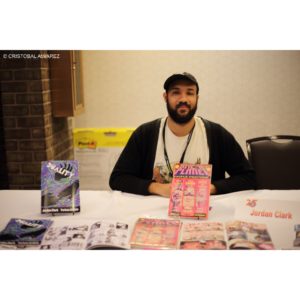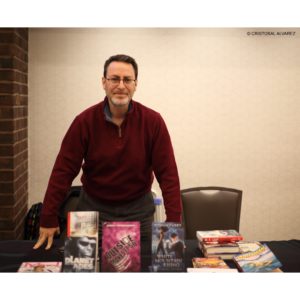Comic book writing – Jordan Clark interview
Podcast: Play in new window | Download
Subscribe: Apple Podcasts | RSS

Jordan Clark is a comic book writer whom I interviewed at Far Point 2018 about his work.
1:35 – Jordan tells me about his writing on Bitch Planet comics. Then he discusses his comic book Duality which has a sci-fi feel to it. He also discusses another book about a Doc Savage type character.
4:48 – Jordan is inspired by things in his own life or things he notices around him. Music playlists help him get in the right state of mind to write.
7:16 – He started writing when he was young. But he didn’t get into comic book writing until after college, about 3 or 4 years ago.
8:27 – Kurt Vonnegut and James Baldwin are two of his inspirations because of their humanism.
10:27 – He’s a big fan of Grant Morrison and Alan Moore. He’s a fan of Silver Age comics. He likes comics that are really comic and have stories you can’t find in other media.
12:45 – He likes the Criterion Collection movies for inspiration. He likes punk music for inspiration, Devo, David Bowie and the Clash.
16:12 – He always wanted super speed so that he could get more stuff done.
18:57 – He’s on twitter at jrsosa18. His website is jclark.squarespace.com.
Links of interest
http://jclarkcomics.squarespace.com/
For more “Creating Sci-Fi and Fantasy – An Inside Look” please follow me on Facebook at crisalvarezwlc, on youtube at Cris Alvarez and on Instagram @crisalvarezscifi
Guests: Jordan Clark
Host: Cris Alvarez
Tags: writer, comic books, duality, doc savage, criterion
 Bob Greenberger has been a writer and editor for decades. He’s worked on the Star Trek comic and as both a DC and Marvel executive he’s worked on numerous comic book projects. His latest work is a Captain America novel. I interviewed Bob Greenberger at Far Point 2018.
Bob Greenberger has been a writer and editor for decades. He’s worked on the Star Trek comic and as both a DC and Marvel executive he’s worked on numerous comic book projects. His latest work is a Captain America novel. I interviewed Bob Greenberger at Far Point 2018.